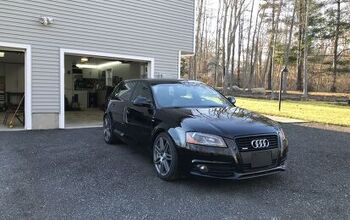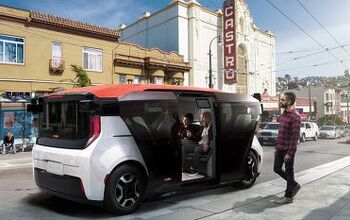Bailout Watch 167: Pelosi: Don't Worry, Be Generous
Dear Secretary Paulson:
We are writing to request that you review the feasibility of invoking the authority Congress provided you under the Emergency Economic Stabilization Act of 2008 (EESA) for the purpose of providing temporary assistance to the automobile industry during the current financial crisis. Under EESA, Congress granted you broad discretion to purchase, or make commitments to purchase, financial instruments you determine necessary to restore financial market stability. A healthy automobile manufacturing sector is essential to the restoration of financial market stability, the overall health of our economy, and the livelihood of the automobile sector’s workforce.
The economic downturn and the crisis in our financial markets further imperiled our domestic automobile industry and its workforce. On Thursday, we separately met with the leaders of the automobile industry, and its top union representative, to discuss the financial challenges confronting the industry and its workforce, and possible actions to address these challenges. We left the meetings convinced that our nation’s automobile industry – the heart of our manufacturing sector – and the jobs of tens of thousands of American workers are at risk. Friday’s news of the automobile industry’s record low sales figures only reaffirm the need for urgent action.
Were you to determine that the automobile industry is eligible for assistance under EESA, we would urge you to impose strong conditions on such assistance in order to protect taxpayers and maximize the potential for the industry’s recovery. An automobile industry that is forward-looking and focused on ingenuity, competitiveness, and the creation of green jobs for the future is essential to its long-term viability. Other taxpayer protections should mirror those required of financial institutions currently participating in the Troubled Assets Relief Program (TARP), such as limits on executive compensation and equity stakes to provide taxpayers a return on their investment upon the industry’s recovery. Any assistance to the automobile industry should reflect the principles contained in EESA that guard against the need to recoup costs to the taxpayers.
We must safeguard the interests of American taxpayers, protect the hundreds of thousands of automobile workers and retirees, stop the erosion of our manufacturing base, and bolster our economy. It is our hope that the actions that Congress has taken, and that the Administration may take, will restore the preeminence of our domestic manufacturing industry so that it can emerge as a global, competitive leader in fuel efficiency and in new and path-breaking energy-efficient technologies that protect our environment. We appreciate your serious consideration of this request, and look forward to your response.
Best regards,
NANCY PELOSI
Speaker of the House
HARRY REID
Senate Majority Leader
More by Robert Farago
Latest Car Reviews
Read moreLatest Product Reviews
Read moreRecent Comments
- SCE to AUX Over the last 15 years and half a dozen vehicles, my Hyundais and Kias have been pretty cheap to maintain and insure - gas, hybrid, and electric.I hate buying tires - whose cost goes by diameter - and I'm dreading the purchase of new 19s for the Santa Fe.I also have an 08 Rabbit in my fleet, which is not cheap to fix.But I do my own wrenching, so that's the biggest factor.
- MaintenanceCosts '19 Chevy Bolt: Next to nothing. A 12v battery and a couple cabin air filters. $400 over five years.'16 Highlander Hybrid, bought in 2019: A new set of brakes at all four corners, a new PCV valve, several oil changes, and two new 12v batteries (to be fair, the second one wasn't the car's fault - I had the misfortune of leaving it for a month with both third-row interior lights stealthily turned on by my kid). Total costs around $2500 over five years. Coming due: tires.'11 BMW 335i, bought in late 2022: A new HID low beam bulb (requiring removal of the front fascia, which I paid to have done), a new set of spark plugs, replacements for several flaking soft-touch parts, and two oil changes. Total costs around $1600 over a year and a half. Coming due: front main seal (slow leak).'95 Acura Legend, bought in 2015: Almost complete steering and suspension overhauls, timing belt and water pump, new rear brakes, new wheels and tires, new radiator, new coolant hoses throughout, new valve cover gaskets, new PS hoses, new EGR valve assembly, new power antenna, professional paint correction, and quite a few oil changes. Total costs around $12k over nine years. Coming due: timing belt (again), front diff seal.
- SCE to AUX Given this choice - I'd take the Honda Civic Sport Hatchback (CVT). I 'built' mine for $28777.To my eye, the Civic beats the Corolla on looks these days.But for the same money, I can get an Elantra N-Line with 7-speed DCT, 201 HP, and good fuel economy, so I'd rather go for that.
- Kwik_Shift_Pro4X '19 Frontier Pro 4X. Next to nothing. All oil changes are on schedule. Got new tires at 60000 miles. Still on original brakes at 79000 miles. Those are due soon. Brakes complete estimate $1000 all in.
- Dr.Nick The cars seem really expensive with tight back seats and Cadillac was on the list of the highest price gouging dealers coming out of COVID. I don’t understand the combination, shouldn’t they be offering deals if they are not selling?






























Comments
Join the conversation
I love the whole "green" jobs thing. The medicine may be worse than the disease. Here is an idea: Save the jobs by canceling CAFE. Let GM make trucks with V8's. If they can get out of their contracts through bankruptcy, then they could downsize into a company that only made what is profitable for them to make.
Okay cancel CAFE rules. Do you really think people will line up to buy expensive trucks when this past summer we paid $4+ per gallon of gasoline? Are you certain we won't be paying it next summer too? I'm not. When I buy a vehicle I expect I'll own it for 5-10 years so I buy a vehicle I'll try to be happy with for 5-10 years. I also try to buy one I can afford to fuel for the next decade as well. I expect in a decade we'll be paying alot more than $4 per gallon. Call me crazy but gas prices are low because the oil industry is trying to lure their addicts (us) back to the pumps more often. Once we're back with our 18 mpg family hauler prices will resume their climb. CAFE will accomplish what economics will do naturally later - push people into more frugal vehicles. Except Detroit's business model doesn't allow a profit on small cars b/c of too much overhead. Oh shit - now what? Lobby for lower CAFE requirements. Just overlook the rising Chinese and Indian lifestyles. Just overlook the fact that despite Al Gore's poor leadership IMHO we may have a pollution problem in the near future. Forget the we are consuming the earth's resources faster every year. Forget that the modern American (and other first world countries) suburban lifestyle is likely unsustainable without using up our resources and damaging our environment. If the car makers can't cope then they are much less imaginative than I thought possible. This is the part of the history books where the American influence begins to shrink. This is the part where we have to acknowledge the ride was fun but it is about over now and it's time to get back to work. This is part where the large vehicle good-ole-boy American my parts are bigger than yours as you can see by the size of my truck and the bull testicles hanging under my rear bumper is over and we have to learn to be clever and imaginative all over again. How do we live in our cities, farm thousands of acres, haul freight, and keep the lights on without consuming thousands of gasolines of oil every minute? We don't have to go back to the 19th century or anything but we have to acknowledge that the easy living can't go on forever. If we don't we'll wake up one morning in the 19th century. Long live Detroit if they can bear to survive.